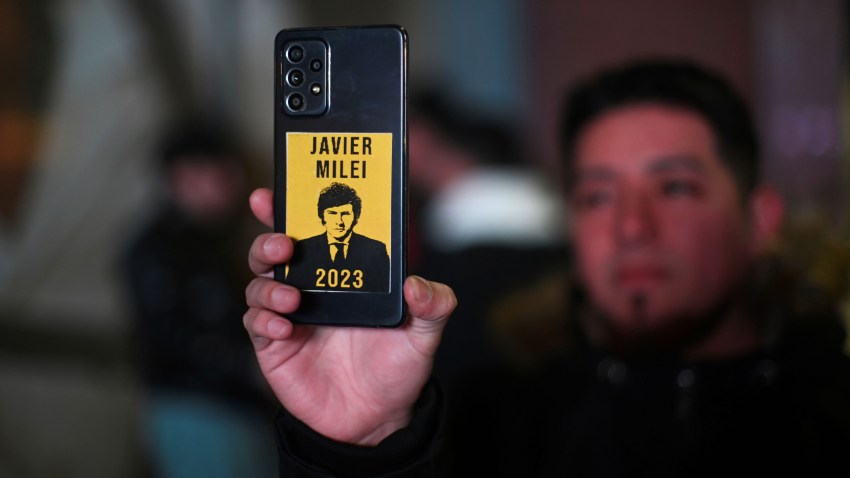Hello, everyone. Today at WPR, we’re covering the surprise victory of Javier Milei in Argentina’s presidential primary and why the U.S. is imposing trade restrictions on China.
Now, here’s our take on today’s top story:
Elections in Guatemala and Ecuador: Two Latin American countries head to the polls this Sunday for closely watched presidential elections. In a runoff election, Guatemalans will choose between a political veteran in Sandra Torres and an outsider in Bernardo Arevalo. (AP)
Ecuadorians, meanwhile, will vote in a first-round ballot to decide who will finish out the term of President Guillermo Lasso, who dissolved the National Assembly in May using a process that also required electing a new president. (AP)
Our Take: In many ways, Guatemala and Ecuador represent the two major challenges facing Latin America.
In Guatemala, that challenge is corruption, which has become embedded within the country’s political class.
Guatemala serves as a cautionary tale about how easily progress on corruption can be unraveled. A U.N.-supported anti-impunity campaign resulted in a wave of high-profile convictions in the 2010s, including of a former president and vice president who were arrested while in office.
But backlashes under two successive presidential administrations have undone those achievements, while inching the country slowly toward authoritarianism. Though Guatemala still holds elections, they can hardly be considered free and fair, with a number of prominent anti-corruption candidates barred from running this year.
That makes the vote Sunday perhaps the last chance to save the country’s democracy. And even if progressive outsider Arevalo—who is leading in the polls—wins, he will face an uphill task in trying to uproot such an entrenched system.
In Ecuador, meanwhile, the biggest challenge is a surge in crime and violence related to the drug trade.
For decades considered to be safe and stable, Ecuador has experienced a crime wave that has turned life upside down for its citizens. More recently, the crime has metastasized into political violence, as the assassination of presidential candidate Fernando Villavicencio on Aug. 9 made clear.
Ecuador’s crime surge is in part the result of regional dynamics and power vacuums among criminal organizations that allowed foreign cartels to make inroads into the country. But it is also the indirect result of political divisions that have weakened the state both during and after the presidency of populist former President Rafael Correa, whose party is now favored to win Sunday’s vote.
Of course, neither corruption nor crime are problems that stay localized. Both drive regional migration that almost always ends up at the U.S. southern border. U.S. President Joe Biden took office in 2021 promising to address the root causes that lead to migration in Latin America, but as both Guatemala and Ecuador illustrate, he has not had much success on that front.

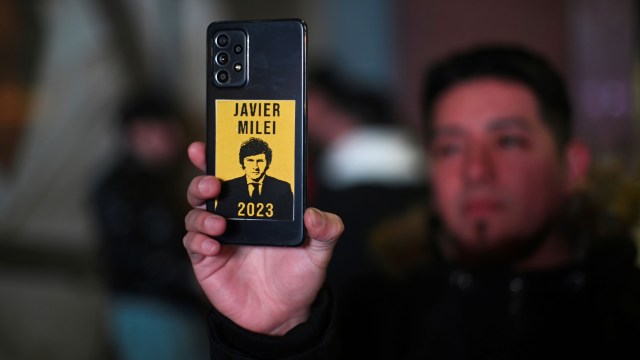
Milei Has Already Changed the Terms of Argentina’s Political Debate
Ostensibly an open election for all political parties to choose their candidates, Argentina’s presidential primaries on Aug. 13 also offered a barometer of voter sentiment ahead of the first-round ballot in October.
The results came as a shock to the political establishment.
Since then, many observers have attributed the victory of Javier Milei, a libertarian economist who rails against the “political caste” and promises to drastically reduce the size of the state, to anger and anti-establishment sentiment. As Bruno Binetti writes, that is not only a mistake, but also an underestimation of Argentine voters.
Biden’s Tech Restrictions on China Aren’t Just About Economics
Last week, President Joe Biden signed an executive order restricting U.S. companies’ ability to invest in a range of tech sectors in China, the latest measure the Biden administration has taken to limit China’s access to cutting-edge, next-generation technologies. But the effort isn’t limited to tech. Biden also maintained the broad range of tariffs imposed on China by his predecessor, former President Donald Trump.
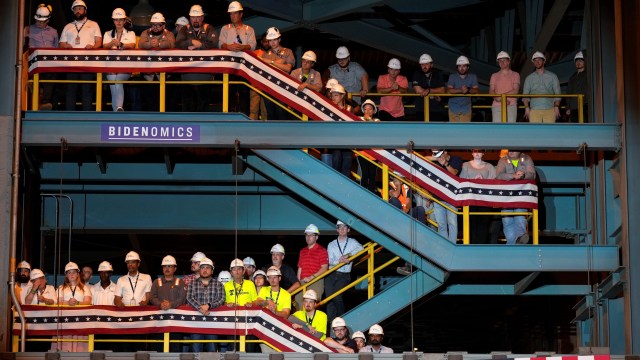
Such policies carry the potential to end economic globalization as we know it. They also raise a fundamental question: Why is the U.S. under Trump and now Biden imposing trade restrictions on China? Columnist Paul Poast offers three potential explanations.

We want to hear your take on the issues we cover.
This week’s question: Last week, the U.S. and Iran reportedly reached an agreement that will see Tehran free five imprisoned Americans in exchange for the return of several jailed Iranians and access to about $6 billion of frozen Iranian funds to be used for humanitarian purchases. Was the U.S. was justified in making the deal? Or did it simply reward Iran for its use of hostage-taking as a tool of diplomacy?
For more context: Read our take in last Friday’s Daily Review.
Reply to this email to give us your take, along with your name and where you’re based. We’ll include the best ones we receive in the Daily Review over the course of the week. Those selected will also receive a free month of WPR.

Ukraine has been attempting to build a case against Russia for committing “ecocide,” a concept not yet enshrined in international treaty law but gaining some sway with international legal experts to describe wanton acts with foreseeable, catastrophic environmental impacts.
The latest example? Dolphins, which the New York Times reports are “washing up dead in droves on the shores of the Black Sea” as a result of the war.
As Charli Carpenter wrote after Russia destroyed a key Ukrainian dam in June, even if such a case is brought against Moscow, the relevant rules of international law would not make a prosecution a simple matter:
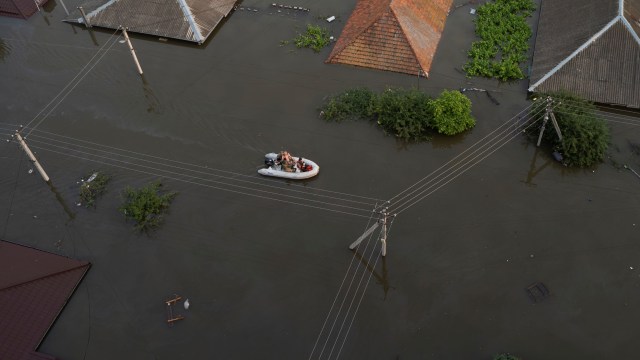
Holding Russia Accountable for ‘Ecocide’ in Ukraine Won’t Be Easy
June 20, 2023 | Ukraine accused Russia of “ecocide” and called for an ICC war crimes investigation into the breaching of the Kakhovka dam. Read more.
On Wednesday, Iran detained at least 12 women activists in what rights groups say is a part of a larger attempt to deter protests marking the anniversary of last year’s uprising in the country, which followed the death of Mahsa Amini while she was in the custody of the country’s “morality police.”
Last year’s uprising was met with a brutal and violent crackdown by the Iranian regime. At the time, Lina Khatib wrote that the protests demonstrated “the limits of the regime’s stranglehold,” while Sina Toossi wrote about why the regime is so resistant to change:
The Only Card Iran’s Regime Has Left Is Repression
Sept. 27, 2022 | In Iran, widespread protests highlight the limits of the regime’s stranglehold on Iranian society and are a grim reminder of its brutality. Read more.
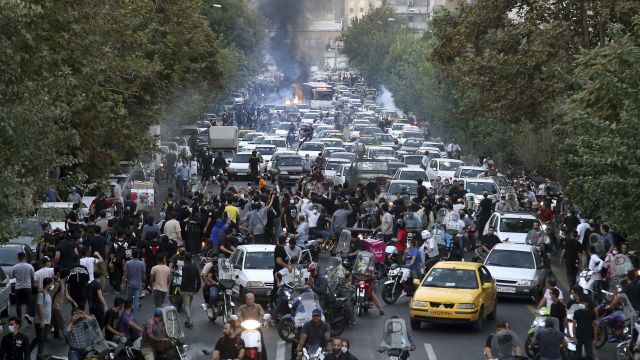
That’s all for today’s Daily Review. Coming up, we’re covering the rise of outsider candidates in Latin America and previewing next week’s presidential election in Zimbabwe.
Have a great day,
Jakob Cansler
More From WPR
- Joshua Kurlantzick on recent scandals in Singapore.
- Frida Ghitis on political upheaval in the Netherlands.
- Bereket Diriba on the conflict in Ethiopia’s Amhara region.
- Alexander Clarkson on the far-left in Germany.

